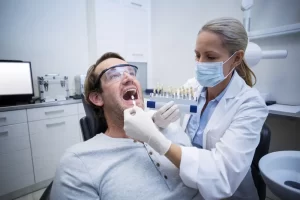
Ever wondered that staying in a hospital may also bring disease to you. You may get infected due to microbes in the hospital. One of the illnesses is pneumonia. So today, we shall see what is hospital-acquired pneumonia and how is it spread?
Hospital-acquired pneumonia is the infection of your lungs, mainly occurring due to staying in a hospital. It may also include postoperative pneumonia. The patients who are not receiving mechanical ventilation may become susceptible to this type of pneumonia.
Hospital-acquired pneumonia is the most common cause of nosocomial infections and also a primary reason for deaths in intensive care units (ICUs)
There are many terms associated with Hospital-Acquired Pneumonia (HAP), which includes:
- Ventilator-Associated pneumonia.
- Nosocomial Pneumonia.
- Healthcare-associated pneumonia (HCAP).
What Causes Hospital-Acquired Pneumonia?
Pneumonia is a familiar illness. Many different germs can cause pneumonia. But pneumonia that starts in the hospital tends to be more severe than other diseases of the lungs due to the following reasons:
- The germs present in the hospital are generally more dangerous and resistant to treatment than those present outside.
- The patients in the hospital are also weak and cannot fight the germs due to poor immunity.
- People who use a respirator (a machine that helps breathe) are generally more exposed to pneumonia from the hospital.
Healthcare providers present in the hospital may also spread hospital-acquired pneumonia by carrying the germs responsible for pneumonia on their hands, instruments, or clothes from person to person. Therefore, it is advised to the healthcare providers to use alcohol-based sanitizers and wash hands often.
Those people can easily acquire pneumonia from the hospital which:
- Abuses alcohol.
- Have any chronic (long term) lung disease.
- Had chest surgery.
- Having a weaker immune system due to certain medications or cancer
- Are older.
- Are on a ventilator.
- Are not mentally prepared due to illness.
- High gastric pH (due to ulcers).
- Functional debilitation.
- Respiratory tract obstruction.
Pathogens
Usually, the most critical pathogens to spread hospital-acquired pneumonia areas:
- Gram-positive cocci bacteria, such as Staphylococcus aureus.
- Some gram negative bacterial species, i.e., Pseudomonas aeruginosa.
- Other microbes include Escherichia Coli,Proteus species, Haemophilus influenzae, and some Acinetobacter
Symptoms
In older adults, the first appearing symptoms of hospital-acquired pneumonia may be confusion or mental changes.
Some other symptoms are seen areas:
- Loss of Appetite.
- Nausea.
- A cough with pus-like phlegm (sputum).
- Fever of about 100°F (37.8°C) and Chills.
- Fast heart rate and decreased blood pressure.
- Sharp Chest pain.
- Shortness of breath.
- Dyspnea.
- Discomfort and uneasiness or ill feelings.
Diagnosis
Your healthcare provider may prescribe you some medical tests if you are susceptible to hospital-acquired pneumonia. These may be:
- Complete Blood Count (CBC).
- Arterial Blood Gases (to measure oxygen levels in the blood).
- Blood Cultures to check whether the infection is spread to the blood.
- Sputum Culture to check the causative agent for pneumonia.
- Chest X-Ray.
- CT Scan to check the lungs.
- Bronchoscopic
- Urine antigen testing.
Treatments
After a successful diagnosis, your healthcare provider may suggest treatments which generally includes:
- Ventilator using a mask or tube to support your breathing.
- Intravenous (IV) antibiotics to treat your lungs infection. The choice of antibiotics is generally based upon the agent causing pneumonia.
- Removing thick mucus from your lungs.
- Lungs treatments.
Preventions
Hospital-acquired pneumonia (HAP) can be prevented by following a set of precautions. The best way to stop the spread of hospital-acquired pneumonia is by:
- Whether being a healthcare provider or a visitor, wash your hands often.
- If you are sick, try staying home.
- Keep your immunization and vaccinations up to date.
- After any surgery, take a deep breath and move around to help keep your lungs open.
- Follow the instructions of your healthcare provider.
- Wear a mask in the hospital.
- Try boosting your immunity by consuming herbal tea.
- Limit your stay in the hospital.
Conclusion
Like regular pneumonia, hospital-acquired pneumonia is also dangerous and is not avoided. Therefore, we need complete guidance provided by an expert. If you are suspected of pneumonia, you should rush to a specialist who treats lung infections and disease as soon as possible. A pulmonologist is an expert in the diagnosis and treatment of pneumonia and other lung problems. To consult the best pulmonologist in Karachi, visit MARHAM.PK.
Frequently Asked Questions (FAQs)
1- Is hospital-acquired pneumonia fatal?
Hospital-acquired pneumonia needs to be treated as soon as possible. If not, it can become severe and even fatal.
2- What is the incubation period of Hospital-acquired pneumonia?
Hospital-acquired pneumonia usually affects those people who stay in a hospital for at least 48 hours. So the incubation period usually is at least two days.
3- Is hospital-acquired pneumonia confused with Coronavirus?
Hospital-acquired pneumonia should not be confused with Coronavirus because other agents cause both lung illnesses. Therefore symptoms of hospital-acquired pneumonia and Coronavirus also vary.
4- Is hospital-acquired pneumonia contagious?
Microbes cause Hospital-acquired pneumonia; therefore, it is highly contagious and can be spread to one another when they contact.






